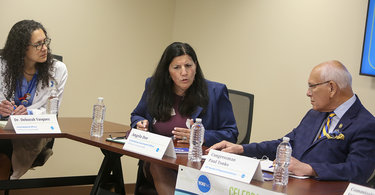‘You get what you pay for’: Health leaders say federal cuts will mean more illness, higher costs
The Enterprise — Michael Koff
“Our patients often get better when they’re understood, when they’re connected, and when people treat them who sometimes look like them,” says Angela Doe, chief behavioral health officer at Whitney Young, at center, as Dr. Deborah Vasquez, Whitney Young’s chief medical officer, at left, and Congressman Paul Tonko listen.
ALBANY COUNTY — “You know what, folks, I don’t know what an American looks like,” said John McDonald, the state’s health commissioner.
That was McDonald’s opening comment at yet another roundtable hosted by Democratic Congressman Paul Tonko on the effects of federal cuts.
This session, held on Wednesday, Aug. 6, at Whitney Young, Albany’s Community Health Center, focused on the federal rule change that now requires Whitney Young and its counterparts across the nation to verify immigration status, forbidding Community Health Centers from using federal funds to treat undocumented immigrants.
The discussion also focused on changes to Medicaid and the Essential Plan, which is the state’s health-insurance program designed for low- to moderate-income adults who don’t qualify for Medicaid, under what Tonko called the “Big Ugly Bill” that will eliminate insurance coverage for millions of New Yorkers.
Statewide, Community Health Centers serve 2.4 million low-income and uninsured patients each year — or one in eight New Yorkers. Nationwide, although they account for just 1 percent of total health-care spending, Community Health Centers serve 10 percent of the population.
Whitney Young, one of 1,400 Community Health Centers across the country, serves over 20,000 Capital Region patients annually, translating to over 70,000 visits.
The health centers, McDonald said, provide “the highest quality care” and are “accessible to everyone.”
He went on, “But, quite frankly, they do things that other places don’t …. Health centers get population health. Health centers get why it’s important to make sure everybody’s got the proper immunization.”
McDonald then asked the assembled health professionals to consider the word “contrast” as he went on to contrast federal direction in health policies with the state policies.
The federal government is making cuts to the National Institute of Health, the Centers for Disease Control and Prevention, and the Substance Abuse and Mental Health Services Administration among others, he noted.
“You see 17 million people becoming uninsured during 2026, 2027. You see the attack on fluoride … You see attacks on vaccines so people like me, who haven’t seen these preventable diseases, now have to brush up on those things,” said McDonald, who is a doctor.
He contrasted this with the state health department initiatives.
“We implemented the New York State Health Equity Reform Waiver … improving individual social determinants of health, right? We just released the master plan for aging … so people can age in place in New York. We just released the prevention agenda — a catalog of all these evidence-based health benefits that we know work in populations. We support community water fluoridation. We support vaccines.
“By the way, we also support health centers and we’re supporting health-care workers … We know what we’re doing at the state health department. I’m worried the federal government doesn’t know what they’re doing or, worse, they do.”
McDonald said he was so blunt because he had read the 870-page reconciliation bill. He was particularly troubled by the last section, on immigration, he said.
“It should bother everybody that over $100 billion is invested in enforcement of this and it should bother everybody with what is happening in the country right now,” McDonald said, concluding his comments with a revelation on his heritage.
“I’m not Native American,” he said. His ancestors came to the United States in the 1800s from Ireland and from Italy. “They just showed up. Quite frankly, in today’s terms, they’d be considered illegal aliens. Just owning it ….
“So, before we look at people and judge them just because of how they got into our country, as a doctor I want to remind people they’re people — and people have health-care problems and they deserve to see a doctor when they need one.”
Late in the hour-long discussion, McDonald said, “When you’re sick, if you feel like no one is even willing to help you, I don’t know how you can be more lonely in this life than that.”
Research
Tonko’s take on Trump’s reconciliation bill, which passed both houses by razor-thin margins largely along party lines, is that it will bloat the national debt by trillions of dollars while “basically cutting trillions out of essential services” — “all of that to provide tax cuts for billionaires.”
He said the Democrats proposed “well over 100 amendments” to the bill and the Republican response was “just we’re not taking any of those recommendations.”
The very last proposal, after a House session that lasted through the night, Tonko said, was made by Congressman Jim McGovern of Massachusetts, whose daughter, Molly, suffered from a rare form of cancer. She died on April 23 at the age of 23.
“His motion was to restore the cut at NIH to [research] the rare cancer that Molly had,” said Tonko. “Here’s a grieving dad offering a legitimate, sensible, compassionate amendment. Somebody in your family might be impacted by the same form of cancer … Molly gained years, at least months because of that research.”
Tonko also spoke of two bills he had introduced, which are now law — to establish a national plan on Alzheimer’s disease and one for Parkinson’s disease.
The epicenter of each of those plans is scientific research, which is now being cut, he said. “When you cut research, you’re cutting hope,” said Tonko.
Prevention
Tonko noted that 62 percent of New York’s Community Health Center patients are enrolled in Medicaid or CHIP, the Children's Health Insurance Program, or dually enrolled in Medicaid or Medicare.
“That’s one in five Medicaid beneficiaries statewide,” Tonko said, noting that 47 percent of New York funding for Community Health Centers comes from Medicaid, making Medicaid the largest share of revenue for the state’s health centers from one source.
It is unclear, Tonko said, if the changes to eliminate care of undocumented immigrants are legal or enforceable although there is a “clear threat” to health centers.
“Currently, Tonko said, “health centers do not collect or have any way of knowing the immigration status of their patients. Providing medical care regardless of immigration status has long been considered both humane and beneficial to whole communities since illness and outbreaks know no bounds and would, indeed affect everyone.”
The cuts that have been made are not about eliminating “waste, fraud, and inefficiency,” Tonko asserted, reiterating Republican claims. He noted federal agencies weren’t consulted about their missions or the culture of their institutions.
“If you’re going to really do the academics here, we would not have canned the inspectors general because they’re the watchdogs; they’re not partisan," he said.
Rather, he said of the Republican initiative, “You’re knocking 17 million people off health care and you’re standing there proudly with a chainsaw in your hand … This is heartless, gutless; it’s cruel.”
In addition to the 17 million people being denied health care, Tonko said that elimination of subsidies provided with the Affordable Care Act will affect another 20 million people — roughly 8,000 in his 20th Congressional District alone.
He also noted that people in crisis would show up at emergency rooms if they could no longer get care at health centers where they “receive preventative or early care that stops a medical problem from becoming an expensive crisis for our hospitals.”
Tonko also posited that everyone’s insurance premiums will increase since hospitals are financed in part by Medicaid.
Rose Duhan, the president and chief executive officer of the Community Health Care Association of New York State, described the centers as the “safety valve” for the entire health system.
“If people cannot get access to preventative care,” she said, “then those chronic conditions are going to become exacerbated.”
A conservative estimate is that, because of the federal bill, health centers will lose $200 million in revenue in the coming year, she said.
Angela Doe, chief behavioral health officer at Whitney Young, said that federally qualified health centers like Whitney Young provide not just quality and affordable primary care but also provide dental services and behavioral health treatment as well as partnering with schools, trade organizations, government representatives, and others in the community.
Many patients with chronic medical conditions also have co-occurring behavioral health conditions and histories of needing special care, she said.
“Recovery doesn’t happen without the connectedness to primary care for them, for their children, and for their entire household,” said Doe.
She said that eating better, having a safe place to live, decreasing stress, and being connected to professionals all improve health.
“Our patients often get better when they’re understood, when they’re connected, and when people treat them who sometimes look like them,” said Doe.
Elizabeth Whalen, who served as Albany County’s health commissioner during the pandemic and is now the medical director of the Office of Public Health for the state’s health department, said, from both a local and state perspective, “The work that the health centers do is the cornerstone of preventive care … a cornerstone of health.”
Addressing the nation’s “epidemic of chronic disease,” in “a reactive manner is not cost effective and it is not patient effective …,” said Whalen. “There are no winners when we have cuts like this.”
Later, Whalen cited a recent paper published in the Journal of the American Medical Association on the status of child health in the United States, which she termed “not a good report” since the United States lags behind its European counterparts.
The report concludes, “The health of U.S. children has worsened across a wide range of health indicator domains over the past 17 years. The broad scope of this deterioration highlights the need to identify and address the root causes of this fundamental decline in the nation’s health.”
“A lot of what we are doing wrong as a system is focusing on reactive care as opposed to preventative care …,” said Whalen. “This is where the resources should be provided to improve health for children and families across the state and across the country.”
Whalen said she is concerned about the current federal vaccine policy and about the disbanding of the United States Preventative Services Task Force, which recommends preventive strategies for people to maintain their health.
“If you look at primary prevention, true primary prevention, that is preventing disease before it occurs. It is possible,” said Whalen.
She repeated herself for emphasis, “It is possible. We know that a tremendous amount of chronic disease is caused by lifestyle factors, is caused by choice, and is caused by social circumstances. These are the things that we have to work on if we want to reduce the current health trends.”
The core of the work, addressing holistic care, social determinants of health, and behavioral health, said Whalen, is provided by Community Health Centers.
“If you are looking at this from a dollars-and-cent perspective,” Whalen concluded, “It is more cost effective.”
Advice
Tonko concluded by asking the group members what advice they had for Congress.
McDonald said exemptions should be automated as much as possible “so there aren’t barriers.”
“The savings come from people not getting health care …,” he said of the legislation. “You don’t get your colonoscopy that you didn’t want in the first place. So then you get your colon cancer diagnosed at a very late stage. And then your care is really expensive when we could have actually found it when it was a benign polyp and stopped your cancer before it even started.”
State Senator Patricia Fahy suggested working across state lines to share problems with what she called “the beautiful betrayal” bill.
“The more you share your stories, the more you bring light to them,” said Fahy.
Fahy, who chairs the Senate Committee on Disabilities, went on, “There is palpable fear in the disabilities community about what is happening and their families are worried about their loved ones being cut off from such critical care.”
Tonko agreed that Medicaid disruption for those families “will be tortuous.”
Groups, he said, are trying to set up volunteer networks “to help Medicaid eligibles with the forms to be filled out.”
Duhan noted that Congress is going to have to reauthorize the federal budget and said that Community Health Center grants are a “significant portion of support.”
The current funding expires on Sept. 30, she noted.
“There’s very broad bipartisan support for health centers and so this is a place where Congress can reach across the aisle to increase support for Community Health Centers through that funding,” Duhan said.
Tonko responded that any language involving diversity, equity, and inclusion would mean denying the grant.
“They get into all kinds of wild discussions as to continuation of the grants,” he said.
Just before the representatives left Washington, D.C. for their summer break, Tonko said, “They did a rescission bill … that’s rescinding what Congress already intended. So you have the situation of bicameral, bipartisan agreements and now he’s revisiting that and he’s threatening to come back with more rescission bills when we return. So nothing’s safe anymore.”
Tonko concluded, “You get what you pay for … What we’re doing here is creating, I think, a new crisis.”



